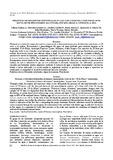Presencia de helmintos intestinales en agua de consumo, comunidad “18 de mayo”, municipio”Linares Alcantara”, estado Aragua, Venezuela, 2011

View/
Date
2013-02-01Author
Palabras Clave
Helmintos intestinales, Agua de consumo, FloculaciónIntestinal helminthes, Water of human consumption, Floculation
Metadata
Show full item recordAbstract
Mediante un estudio de campo, descriptivo y transversal, se determinó la presencia de helmintos intestinales en 10
casas y el análisis fisicoquímico y parasitológico del agua del pozo profundo para consumo humano en la
comunidad 18 de Mayo, municipio Francisco Linares Alcántara, estado Aragua. Con muestras de 20 litros por
duplicado, tanto de las viviendas como del pozo, se aplicó la técnica de concentración por floculación, para luego
realizar observación directa con solución salina y lugol. Se observó en el 60% de las viviendas evaluadas la
presencia de huevos de helmintos, encontrando: huevos de Anquilostomideos sp. (30%), Trichuris trichiura (20%)
y Ascaris lumbricoides (10%). En el pozo no se evidenció la presencia de helmintos intestinales y su análisis
fisicoquímico estuvo dentro de los valores referenciales a excepción del cloro que no mostró su presencia en el
análisis, lo cual es indicativo de que no está recibiendo el adecuado tratamiento. Las infecciones parasitarias
causadas por helmintos pueden adquirirse mediante el consumo de agua y alimentos contaminados con huevos
fértiles o larvas infectantes L3, en tal sentido es importante verificar su presencia en el agua y supervisar las
condiciones de integridad de la red de distribución hacia las viviendas.
Collections
Información Adicional
| Otros Títulos | Presence of intestinal helminthes in human consumption water in the “18 de Mayo” community, “Francisco Linares Alcantara” municipality, Aragua state, Venezuela |
| Correo Electrónico | lilianagallego444@hotmail.com juanc_sh@hotmail.com |
| ISSN | 0798-3166 |
| ISSN Electrónico | 2244-8829 |
| Resumen en otro Idioma | Through a field, descriptive and transverse study, it was determined the presence of intestinal helminthes in the water of 10 houses and the physical-chemical and parasitological analysis of a deep well water for human consumption in the “18 de Mayo” community, “Francisco Linares Alcantara” municipality, Aragua state. On samples of 20 liters by duplicated from the houses and the well, it was applied a concentration technique of floculation, to realize direct observation using saline solution and lugol. It was observed presence of helminthes eggs in 60% of the analyzed houses, finding: eggs of Ancylostomideos sp. (30 %), Trichuris trichiura (20%) and Ascaris lumbricoides 10 %. In the well, it was not found the presence of intestinal helminthes and its physicalchemical analysis was within the references values with the exception of chlorine that was absent in the analysis, which is indicative of the fact that is not getting the proper treatment. Parasitic infections caused by helminthes can be acquired through the consumption of contaminated water and food with fertile eggs or infective larvae L3, in this regard it is important to verify their presence in the water and monitor the conditions of integrity of the network of distribution toward homes. |
| Colación | 87-92 |
| Publicación Electrónica | Revista MedULA |
| Sección | Revista MedULA: Articulos originales |





